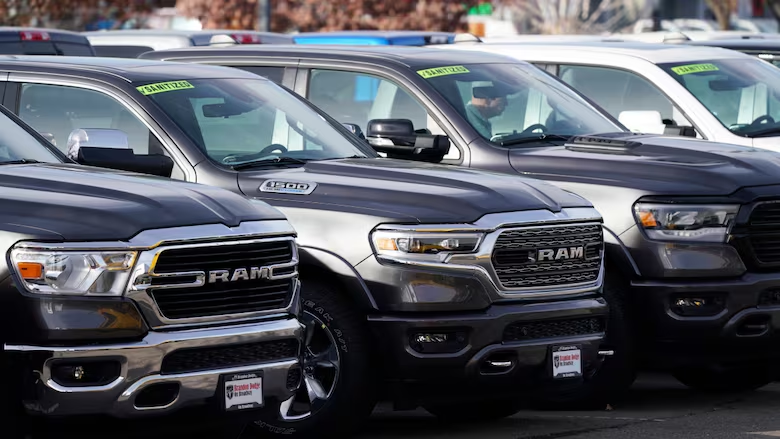The recent scandal involving stolen vehicles traced to Ghana has sparked intense discussion on accountability in the vehicle import chain.
With more than 100 cars, mainly from the United States, linked to theft cases abroad, concerns are growing over the role of port authorities and the systems in place to detect such illegal entries.
The Executive Secretary of the Vehicle and Assets Dealers Union of Ghana (VADUG), Frank Atanley Kofigah, insisted that the real responsibility lies with the Customs Division of the Ghana Revenue Authority, not local car dealers.
According to him, the issue of stolen cars entering the country is not one that importers can resolve on their own. Instead, the Customs Exercise and Preventive Services (CEPS) should be the first line of defence, given their mandate to verify, clear, and authorize every car that enters Ghana before it reaches the local market.
Kofigah explained that vehicle dealers rely entirely on Customs and other port processes to validate the authenticity of the cars they purchase.
“What we are saying is that the Customs Divisions of the Ghana Revenue Authority are the gatekeepers to ensure that these (stolen) vehicles do not even get into this country in the first place because the theft did not happen on our grounds; it happened in a different jurisdiction.”
Frank Atanley Kofigah

He argued that when a vehicle makes it through the various clearance stages, including National Security checks, dealers naturally assume it has been thoroughly vetted.
He went further to illustrate the predicament dealers face when making purchases. If presented with a luxury car such as a Lamborghini at an attractive price, the dealer may assume it is either a repairable vehicle or a rare market opportunity.
The dealer’s main safeguard, he explained, is the Customs documentation that certifies the vehicle’s clearance. Once that is provided, dealers have no reason to doubt its legitimacy.
Limited Access To Verification Tools
Frank Kofigah also stressed that importers have limited avenues for independent verification of cars before they are released.
He pointed out that until recently, many dealers were unaware that INTERPOL provides a platform for checking a vehicle’s status or that Ghana’s Economic and Organized Crime Office (EOCO) offers VIN verification services through its front desk.
Instead, dealers often rely on basic checks such as VIN lookups or car history reports, which do not always flag stolen vehicles.
“We as a Union cannot do that check; the only agency mandated with that oversight responsibility is the Customs; they have the system to check that these vehicles do not come into the country.”
Frank Atanley Kofigah

This revelation has highlighted a systemic gap in the country’s vehicle importation process.
Dealers argue that they cannot reasonably be held accountable for cars later found to be stolen if those cars were initially cleared by Customs and port authorities.
EOCO Steps In To Repatriate Stolen Vehicles
Meanwhile, the Economic and Organized Crime Office has been actively working to address the situation.
Leo Antony Siamah, Head of Legal and Prosecutions at EOCO, revealed that between 100 and 115 vehicles have so far been retrieved, many of them originating from the United States and Canada.
Efforts are currently underway to repatriate these vehicles in accordance with formal requests made by victims abroad.
He explained that when victims of stolen cars discover the eventual destination of their vehicles, they file requests through international partners such as the FBI and the Royal Canadian Mounted Police.
EOCO then pursues legal processes in Ghanaian courts to secure civil orders that authorize the return of the cars.
In some cases, ownership complications arise due to insurance claims. If the stolen vehicles were already compensated for under insurance, the insurance companies themselves step in as the official claimants.
“So what happens is that when the vehicles are stolen, the victims, when they find out about it in terms of the destination of the vehicle, they make formal requests to our foreign partners, the FBI, and the Royal Mounted Police of Canada for their vehicles.”
Leo Antony Siamah

He noted that in Canada, the repatriation costs are borne by the victims themselves, adding financial strain on individuals who already suffered the loss of their vehicles.
The United States, however, provides some governmental support to ease this burden.
The scandal has once again raised questions about Ghana’s import systems and the extent to which agencies at the port are equipped to prevent fraudulent activities.
Dealers maintain that they should not bear the brunt of blame when vehicles are later flagged as stolen, given that they rely on official documentation issued at the port.
Observers argue that the situation underscores the need for stronger oversight mechanisms at the country’s entry points.
Without tighter screening systems and more transparent verification tools accessible to both Customs and importers, the risk of Ghana becoming a destination for stolen cars remains high.
For now, EOCO’s recovery efforts and international cooperation may provide some relief, but the scandal highlights broader concerns about accountability, security, and trust in Ghana’s vehicle import system.
Until these structural gaps are addressed, the problem of stolen cars slipping into the country is unlikely to disappear.
READ ALSO: Reform UK Floats Taliban Deal On Migrants























